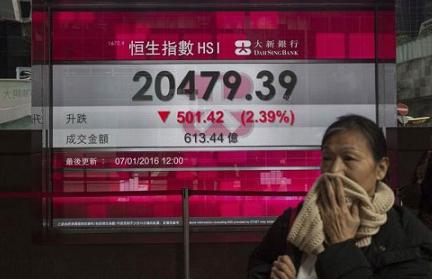The economic crisis has divided the capitalist parties
The US economy, closer to the abyss
07/10/2008

Orginally published October 2, 2008
At press time, the US Senate was voting in favor, by 74 votes to 25, of the so-called Paulson Plan, which uses a sum of $700 billion dollars to rescue the banking system. This approval by the Senate attempts to respond to the political crisis begun on September 29, when the House of Representatives had rejected the plan, which led to a real "black Monday" with the fall of stock markets around the world. The bailout plan needs the approval of both Houses, which it will try to get with the backing of the Senate. But, independently of whether Congress ends up approving it in the coming days, the great giants of US banking are suffering an unprecedented loss of confidence. This could, for instance, lead to a run on the international interbank circuit of the main foreign banks, if doubts over the solvency of US financial institutions grow. The colossus of world capitalism increasingly resembles Argentina in 2001. It is unbelievable that the comparison can be thought of, in spite of the obvious differences. Thus it is that economists like Paul Krugman are already talking about a "banana republic."
This week the crisis struck big European banks and has led to a wave of bailouts and nationalizations in several countries, showing that it has definitely become an international crisis.
Political crisis in Washington
The uncertainty that had seized Washington in the face of the acceleration of the crisis jumped in a nightmarish manner with Monday’s rejection of the Paulson Plan by the US Congress’ House of Representatives.
This result expresses, in the first place, the extreme weakness of Bush, who has the lowest approval rating of his presidency (26%), while more than 70% disapprove of him. This was obvious from Bush’s inability to convince public opinion and his own party of the need for the bailout plan. Secondly, the vote expresses the fierce divisions in the Republican Party, one of the two pillars of the bipartisan system. These divisions do not appear to be capable of being solved: if McCain loses the elections, which right now is most likely, these divisions will deepen, and if he managed to win, he would not be able to unite the party either. In fact, he had no influence on its most right-wing sectors, which called the attempt to transfer a vast sum of money to the richest people, "socialism." Although this speech could find an echo among groups of the middle classes, desperate because of the mortgage crisis, the program of the Republican right wing is to lower taxes on the rich still further and destroy the little that remains of Social Security, by transferring public money to big capital, but through other ways.
The Democratic Party, in spite of its open alliance with Wall Street, and in spite of the fact that Barack Obama supported bailing out the bankers from the very first and agreed with Bush and McCain on the details of the plan, was not able to avoid having a group of its most populist legislators or "liberals" vote against the President’s proposal, arguing that it was a bailout of the multimillionaires of big banking, in spite of the decorative amendments that were incorporated to make the proposal more acceptable to the population. In addition to the distrust by the financial market because of the limits added to Paulson’s original plan, and the opposition of a large number of economists, who consider that the bailout is expensive but ineffective for overcoming the crisis (see LVO 296 <http://www.pts.org.ar/spip.php?rubr...> ), rejection of the bailout plan by a large part of the population was the determining element that exerted pressure on the legislators of both parties. This new political reality adds an element of great uncertainty to the crisis and to its likely solutions that makes the crisis unpredictable. The break-up of the "neoliberal coalition" (now Bush, but also Obama and McCain) in the voting in the House of Representatives was sufficient to oppose Paulson Plan I, but it is unable to offer a New Deal-type of alternative, since right now it is impossible that they will come together politlcally beyond this last vote. On the other hand, the appearance of lines of division in both parties is a serious element, that has exposed the weakness of the bipartisan system at a moment of extreme vulnerability, that requires and will require ever bigger budget and financial decisions, for which congressional support is technically, legally and politically necessary. For that reason, the only sure bet is a deepening of the crisis, even if they manage to approve some package.
Beyond the fact that the markets have returned to believing in the bailout — as the Tuesday rebound of the stock markets shows, after the biggest fall on Wall Street since the 1987 crash — that optimism really does not rest on any substantive advance in negotiations. In the final analysis, reactions by European and US markets throughout the week will show if simple panic and the subsequent financial setback are stronger than the attempts by the world’s central banks to get the money markets out of paralysis. The repercussions of this situation on the big industrial and service-sector companies, which are currently solvent, with profits and operations, could be enormous, to the extent that they lack short-term credit to finance payment of wages and operating costs, precipitating an even more disastrous phase of the crisis.
The sword of Damocles over the US financial system
The crisis in the US keeps getting worse. As one Japanese analyst says: "From Japan’s experience in the 1990’s, it is clear that the US financial crisis is following a familiar model.... We are now experiencing the ’wolf pack syndrome.’ Wolves are good at attacking their prey as a team, but they turn against the weakest members of their own pack if hunger prevails. When Lehman fell, Washington Mutual became the next victim, followed by Wachovia. When Wachovia merged with Citicorp, people began to look at National City. This goes on until the last wolf does not find anything to hunt. In Japan, we now have three national banks, down from more than a dozen in 1980. According to the Japanese Financial Services Agency, they were all too big to fail.... At this rate, the US is also headed towards having three mega-banks...." (“America must seek aid for a global credit line”, Kenichi Ohmae, Financial Times 9/30/08). This prospect does not seem very distant. This week’s acquisition by Citigroup of the operations of Wachovia Corporation, the sixth-largest US bank, reinforces the idea of a concentration into three hegemonic banks, Citigroup, JP Morgan and Bank of America, that will control more than 30% of deposits. This trio will thus acquire enormous power in establishing prices for their credit and services, which they will not repay to their clients, who are now supporting them with their taxes abundantly used for bailing the trio out.
But much is still missing, in order to arrive at this result, and more catastrophic scenarios cannot be ruled out. As the economist Nouriel Roubini says, "This is a crisis of credit and solvency that goes beyond a lack of liquidity. No one is lending anything to anyone, and no one believes anyone (not even the most reliable people), and everyone is hoarding the liquidity injected by the central banks. And as liquidity goes toward the big banks, the rest of the system does not have access to funds, and the mechanisms of credit transmission are blocked." Roubini then mentions two traditional Wall Street names: Goldman Sachs and Morgan Stanley: "After the fall of Bear Stearns and Lehman Brothers, and the merger of Merrill Lynch with the Bank of America, I suggested that Morgan and Goldman should also merge with some financial institution that had a big base of insured deposits, to avoid a sudden run against them. Instead, Morgan and Goldman chose a cosmetic option, becoming commercial banks in an attempt to get liquidity.... In the short term, neither of these two institutions can create a franchise of subsidiaries, nor do they have the time or resources to purchase smaller banks. The injection of $8 billion dollars of Japanese capital in Morgan and $5 billion from Buffett in Goldman, are a drop in the ocean, because both need more capital. More banks are losing clients and business." In these circumstances, "... they should now merge with big international financial institutions, given that no US institution is sufficiently sound to join in a merger." For this economist, the worst could be yet to come: "The next step in the panic could become the mother of all runs on banks, a run against liabilities of banks, and of the US financial system in the interbank market among countries, of billions of dollars to the extent that foreign banks begin to worry about their security of their exposed liquidity in US financial institutions" (Global EconoMonitor, 9/29/08). In other words, the attempt of the Treasury Secretary, Paulson, to rescue his friends at Goldman Sachs could have huge "collateral damage." If this scenario takes place, undoubtedly the repercussions will not be limited to the US, but will be global. A widespread run by foreign banks and governments against corporate bonds, stocks and US Treasury bonds raises the danger of fragmentation of the global commercial and investments system.
A potentially revolutionary period of convulsions is beginning
It is unquestionable that the US has taken yet another step towards a Great Depression. If it manages to avoid the scenario of a crash, the most likely prospect appears to be that of a lost decade, like Japan in the 1990’s. This situation, together with the Russian challenge in Georgia, a US ally, signals the end of the period of unquestioned US hegemony, that opened after the disaster of the former USSR. The early stages of this hegemonic decline were, on the one hand, the crisis of 1997-1999, that marked the loss of US authority in the entire semicolonial and dependent world, for example Russia and China, that were openly moving away from the Washington Consensus and the IMF. On the other hand, the failure of militarizing foreign policy — a response to this loss of political influence that began under Clinton and was taken to the extreme by the Bush administration, as was obvious with the military disaster in Iraq and Afghanistan.
The idea that the qualitative weakening of US leadership would mean the rise of a more multilateral or multipolar world, with a greater balance of power among the great powers, is not only illusory but, above all, dangerous, because it does not allow arming oneself for the convulsive period that is beginning. As the British Marxist economist Alan Freeman says, "Many people say that we can go peacefully to a more multipolar world. But capitalism needs for there to be one single world system, requires that there be only one reference currency and only one financial system. All the experiences of times with multilateral balances of power ended in blocs that confronted mercilessly. None was peaceful" (Crítica, 10/01/08).
The illusions of the ruling elites in Europe and other countries that an Obama administration would mean a return to the "good" times of harmonic and peaceful globalization in 1991-1997 died before Obama will possibly arrive at the presidency.
We are entering an extremely convulsive period, characterized by a leap in international and economic tensions, with likely proxy wars, like the one in Georgia ,or vehement protectionist measures and commercial wars for the capture of capital, and therefore bigger tensions in the class struggle. In summary, a time of updating what Marxists of the beginning of the twentieth century called the "epoch of crises, wars and revolutions." The working class is behind, regarding the development of events. However, the crisis is going to shake the working class, its organizations, and its conservative consciousness violently. Those who, affected by the negative consequences of the advance of capitalist restoration in the former USSR, Eastern Europe, and China for the workers’ movement and the mass movement, have posed the need for a "new epoch, new program, new party," leaving behind the lessons of the Russian Revolution and Bolshevism, were too quick to adapt themselves to a brief impasse that has ended. The lessons of those great workers’ revolutions, adapted to the current situation, are becoming more necessary than ever, in order to confront the catastrophe with which capital now threatens us. The need for the proletarian socialist revolution, to put an end to the power of the big banks and corporations, is becoming more and more obvious.
======
The crisis strikes Europe
At the end of September, the fall of financial firms spread to the European Union. In just one day, the governments of seven countries had to come to the rescue of five financial firms. France is pondering what to do to prevent the collapse of some of its large banks. The bailout of Fortis by the governments of Belgium, the Netherlands and Luxemburg, with the injection of 11.2 billion euros in exchange for 49% of its capital, was the first in a series of failures.
Subsequently, another big firm, the Franco-Belgian bank Dexia, was helped by the authorities of both countries. The combined crisis of these two banks has meant a big political shock in Belgium.
This was followed by the British government’s nationalization of the mortgage bank Bradford & Bingley, taking charge of the 50 billion pound portfolio ($91 billion US) of mortgages and other credits. The government paid an additional 18 billion pounds ($33 billion US) to facilitate the sale of Bradford & Bingley’s savings banks, including all of its retail branches, to the Spanish Banco de Santander, the second biggest in Europe, that announced it will pay 612 million pounds ($1.1 billion US) for the 197 branches of Bradford & Bingley and the 20 billion pounds [nearly $35 billion US] in deposits.
The same day, the German economic ministry asked a group of private banks to help rescue the Hypo Real Estate firm, the second-largest mortgage bank in Germany, through an injection of 35 billion euros. However, at the end of the week, this plan is up in the air, and the bank, on the verge of bankruptcy. This firm issues bonds that are in the portfolios of many financial institutions throughout the world, which is why its fall would have a strong cascading effect similar to that which the bankruptcy of the insurance company AIG, nationalized by the US government two weeks ago, would have had. Finally, to prevent this outcome, a new bailout was agreed upon.
Lastly, in Denmark the Roskilde Bank had to be taken over by the central bank, which subsequently sold its branches to three other firms. Meanwhile, in Iceland, the government agreed to keep 75% of Glitnir Bank, the third-largest bank in the country in market capitalization, for 600 million euros. This shows that the financial system is in a hellish spiral that does not stop. As the French Marxist economist Isaac Joshua says, "We have even arrived at a domino effect that anticipates its own motion. Once a piece has fallen, the financial actors look for which one will be the next, convinced that there will be another one. Once a victim is designated, the pack of wolves surrounds him, isolates him, fixing their feverish eyes on him, waiting for him to fall, to tear him apart, without ceasing to complain about the dreadful crisis. The logic of the financial crisis supports itself" (Rouge, no. 2267, 9/25/2008).
What happened in Europe this week is an alarm signal about the financial system and the banks exposed to the US crisis and to the accumulation of debts from the real estate market of countries like England or the Spanish State. Let us add to this that many European banking firms are "too big to be allowed to fail" but "too big to be rescued" by the national governments of their respective countries, unless a rescue mechanism is set up on a continental scale. In this context, perhaps the most unusual thing was the decision by the government of Ireland to guarantee the deposits in the country’s banks for two years and their debt issuances, with the aim of calming the population and holding up its financial system. This de facto nationalization of the entire financial system is being investigated by the European regulatory authorities to see if it constitutes anti-competitive behavior, which would give Ireland advantages over the rest of Europe, which has led the French authorities to do the same. This decision by the main economy of Europe could lead to the rest of European governments doing the same, and investors would have to decide which sovereign guarantee is the most secure. We would be facing the beginning of a ruthless struggle for scarce capital among the different European imperialisms, which would call their monetary union into question.
Translation by Yosef M.










